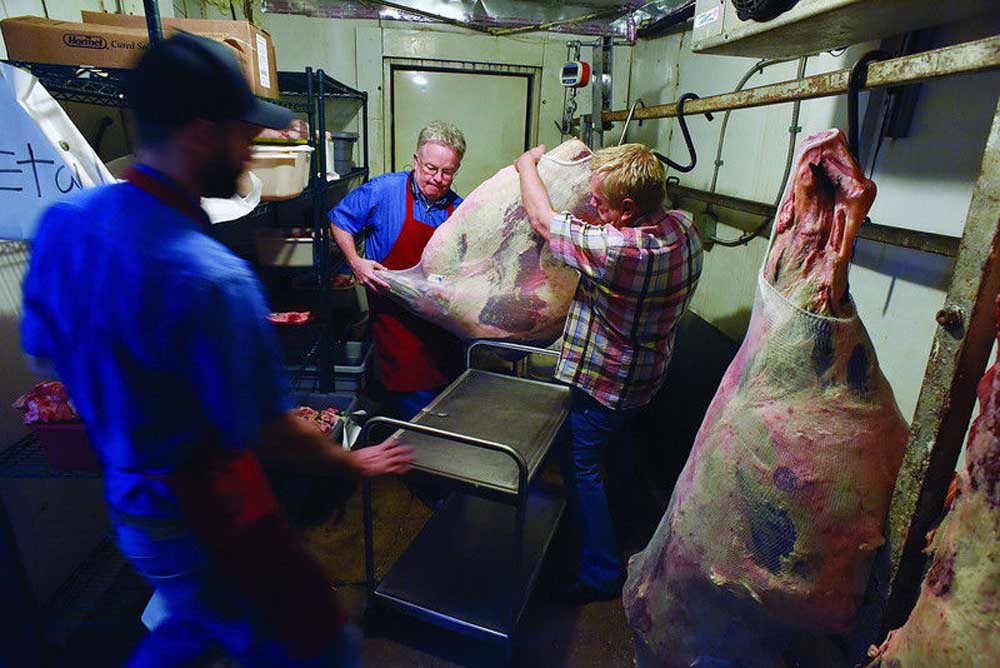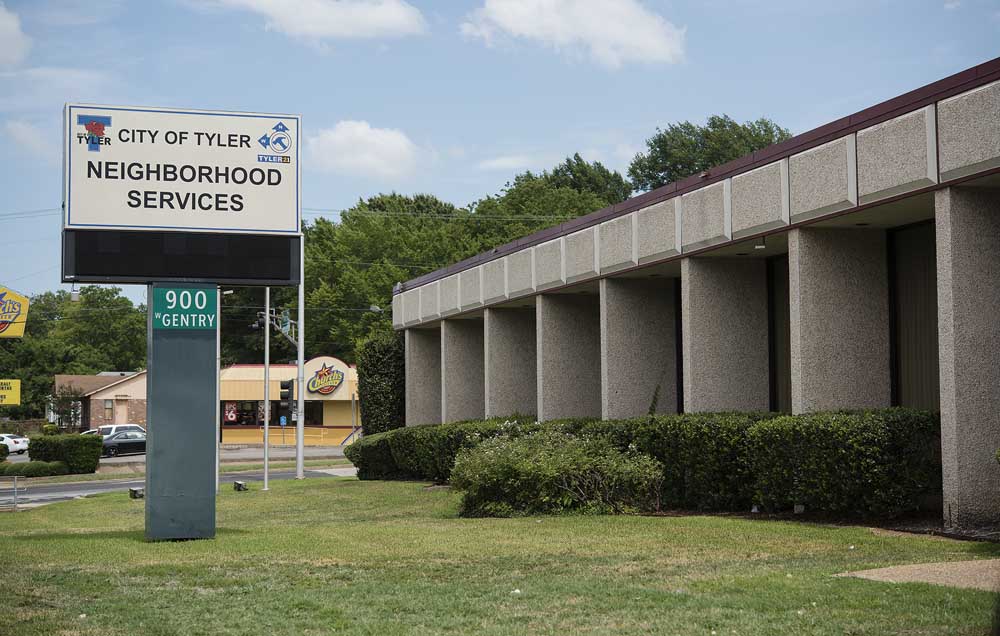As Memorial Day weekend kicks off the grilling season, we take a look at an East Texas institution, Country Meat Market
Published 10:44 am Tuesday, May 31, 2016

- Jeremy Dawson, left, pushes a cart into place as Tom Koehler, center, and Steve Morris muscle a front quarter of beef from a rack in the cooler Monday, May 23, 2016, at Country Meat Market in Tyler. Andrew D. Brosig
At the age of 5, Steve Morriss was hard at work in his father’s butcher shop, sacking eggs, carrying out groceries and greeting customers. In the fifth grade, he had a work permit – in elementary school – and he would stand on soda crates to grind hamburger and slice meat. He learned every aspect of the Country Meat Market business from his father, Thomas McLean “Bud” Morriss, who served three generations of East Texas families.
Steve Morriss is a successful real estate developer now, with projects in Memphis, Dallas, Albuquerque and throughout the country. But he hasn’t really left anything behind. Bud Morriss may be gone now – he passed away in October 2010 – but Country Meat Market is still serving East Texas families. And Steve Morriss still oversees much of the operation, even bringing his development partners to Tyler to show them what a successful business, built on relationships and integrity, should look like.
“When my dad passed away, he asked me to keep the store going,” Morriss said. “And I did, in honor of him. My sister is still a co-owner. But even now, I bring every mayor, every councilman, every investor here for a visit, so they can understand my roots. Where did I get my work ethic? It comes from right here.”
THEN AND NOW
Bud Morriss served in the U.S. Navy in World War II, then came home to Tyler, where he was born in 1925. In 1954, he opened Country Meat Market in downtown Tyler. He carried some other groceries, which varied, but mostly he focused on meat.
It was a different time then, and “one-stop-shopping” wasn’t a business model. People liked going to the butcher shop, seeing neighbors and talking with the man cutting their meat.
If they wanted steaks, they could hold their fingers to show the exact thickness they desired; if they wanted stew meat, they could tell the counterman how many they’d be feeding that night.
Back then, bacon wasn’t a vacuum-packed, water-injected mystery; it was something to order from a man who would slice it in front of the customer. And sausage was almost an art form. Butchers guarded their individual recipes and reputations were built on quality and consistency.
Country Meat Market was successful, and in 1964, Bud Morriss moved it to a new location at 2308 E. Front St. In that location, it has watched grocery store chains and big-box stores come and go, rise and fall – all the while, providing the same kind of service that kept customers coming back to the Morriss’ counter.
Today, Steve Morriss and his staff see, with some pride, that the culture is coming back around to how they do business.
What’s Wal-Mart building these days? Neighborhood Markets. Grocery stores are putting their butchers back out front, and customers are asking for the kind of quality, selection and individualized attention that Country Meat Market has offered all along.
“People see that bigger isn’t always better,” Morriss said.
HONORING MEMORIES
Tom Koehler isn’t a butcher – at least, he wasn’t until recently. He’s a real estate developer who works with Morriss on development projects. But like Morriss, he sees the Country Meat Market as an integral part of their company, The Consortium Firm – if not in bottom-line numbers, at least in soul and spirit.
A few months ago, when a longtime manager of the market retired, Koehler agreed to don a red apron and step in.
“Steve has kept the market open to honor his dad, and I respect that,” Koehler said. “We’ve done some hiring, and now we’ve got a really good crew. I’ll be able to step back in a month or two, and focus again on some of our other projects.”
Those new workers include Jeremy Dawson and Joe Snyder; both young men have backgrounds in business and finance.
Morriss and Koehler say that’s important, just as important as having the young men learn the trade.
“If you can stay here for a couple of years, and learn about business and service and quality, we’ll move you up in the development organization,” Morriss said. “We’ve got good people here, and they’ve got bright futures with us.”
QUALITY MEATS
Koehler said the qualities that make Country Meat Market’s products different begin on the farm.
“We find that the thing of first importance is genetics,” said Koehler. “There are breeds better for dairy, for example, and breeds better for beef. We use a half-Herford, half-Angus mix. We find that if you get that part right, the DNA, that’s half the battle.”
The next part of the battle is in the raising of the beef cattle.
“If you raise cattle in a high-stress environment, with a lot of adrenaline, that makes the meat tougher,” he explained. “So we don’t want our cattle raisers using cattle prods, for example. You can move your cattle along without electric prods. We’re very specific about that.”
And they demand that their suppliers not overcrowd the feed lots.
“Lots can’t be at more than 75 percent capacity,” Koehler said. “We don’t want the cattle crammed in there, being force fed. We require that the cattle be treated more humanely, and we find that the end product is better. We only use suppliers we know and trust will do that. Our suppliers know we’re watching, and that we care.”
Morriss still spends some mornings at the feed lots and packing houses himself, choosing cattle on the hoof, just as his father taught him.
“Some days I’m on the floor at the packing house at 4:30, 5 a.m.,” he said. “And you know what? I don’t see anyone else there; it’s just me and the packing staff. If you want to know what we do differently, that’s a big part of it.”
Country Meat Market has a private label, Black Label Reserve Beef. Their suppliers sign affidavits that the cattle is bred and raised according to the standards set out in the program, and the meat is graded at the plant level by USDA inspectors for the level of marbling and mass. It’s hormone-free and corn-fed.
Quality control extends to how the meat is bought and stored, Morriss explained.
“Our beef never sees the inside of an 18-wheeler,” he said. “It’s processed and delivered to us directly. We don’t use boxed meats, and we can offer some things – such as beef ribs – that you’re not going to find many other places, because we buy the whole carcass.”
And Country Meat Market slices everything by hand.
“We don’t use power saws here, except for the bone,” Morriss said. “We use the knife, for the quality. The saw can burn the surface of the meat and leave a layer of bone-dust. I can taste it when I eat a piece of meat that’s been through a saw.”
There are no glass display cases in Country Meat Market, and that’s on purpose; the meat stays fresher in the coolers (which are kept just above freezing) and anyway, the meat is going to be cut just how the customer wants it.
“Quality is everything,” Morriss said. “I train my guys that if a customer leaves happy, that’s only half the battle. We want customers to be happy when they get home and check the quality of the product. We want them happy when they sit down to dinner. That’s when it really counts.”
THE FUTURE
“This is still very much a family operation,” Morriss said. “We’re trying to stay true to my dad’s memory, to his way of doing things.”
He’s not ready to pass on the business to the next generation – at least, not yet.
“None of my kids are really interested in the business now,” Morriss said. “They have their own things going on. I do have a grandson, Matthew, who lives in Nashville. He’s a freshman in college now, but he’s a young entrepreneur and he’s very interested in coming into this business.”
Morriss hopes that Matthew does take over someday. That would continue Bud Morriss’ legacy and carry on the tradition.
“The real goal is simple,” Morriss said. “When you come to Country Meat Market, we want you to feel like you’re coming home.”
IF YOU GO
What: Country Meat Market
Where: 2308 E. Front St.
When: 9 a.m. to 6 p.m., Monday through Saturday.
America’s Favorite Lean Beef Cuts for Grilling
1. Strip steak
2. Top sirloin steak
3. 93 percent lean ground beef
4. Tenderloin steak
5. Flank steak
6. Tri-tip
Source: National Cattlemen’s Beef Association






